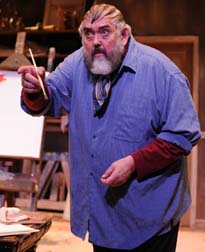In the thirties, he [Zero Mostel] was hired by the WPA (Works Progress Administration, for those who don’t’ know history) – along with such painters as Jackson Pollack and Moses Sawyer. Later, he gave art lectures filled with jokes. That led him in 1941 to appearances at the night club, Café Society, in Greenwich Village. He was wildly funny, on stage and off. He was manic. He got people helpless with laughter. Some of that comes through in Brochu’s performance.But most of the stage story is political. Zero was a Marxist. Brochu/Zero says that “Anybody with half a brain was, because of what was going on in Europe: fascism.”
That made him a target of the House Un-American Activities Committee’s crusade against free speech in 1955. “Are you a communist?” he was asked at a hearing. “Well, you certainly don’t beat around the borscht belt, do you? No, I am not a communist, ” Zero replied.
“Are you in favor of the violent overthrow of the government?,” he was asked, in a question that violated the First Amendment protection of free speech, not to mention thought.
Zero replied, and the text is from his testimony, “Well, sir, as our fourth president, James Madison, for whom they named a lovely hotel on Collins Avenue in Miami Beach once said, “I believe there are more instances of the abridgment of the freedom of the people by silent and gradual encroachments by those in power rather than by violent and sudden usurpations.”
...
Zero tells the appalling story of Phil Loeb, the actor who played Jake on the TV serial, “The Goldbergs.” He recounts, “He lived his life practicing the greatest principal of America – that all people were created equal and should be treated that way. Even actors.
Outrageous! Do you know what his “Un-American activities” were? He was fighting for black actors to be able to use the same stage door as white actors, he was fighting for equal pay for men and women, , paid rehearsal time, hot running water in dressing rooms. Horrible! Despicable!”
“So the Committee subpoenaed him and they blacklisted him and they destroyed him and then all of America sat back and said, “Of course he shouldn’t work. He’s evil. He’s the Jewish devil!” And the man lost everything. And Kate and I took him in and he lived with us. We cared for him. We fed him and we clothed him and then we watched him disintegrate.”
...
This is a fascinating and important play, not only for its dramatic heft, but for the story it tells about America’s dark days of ideological repression.
Saturday, January 16, 2010
An Article Analyzing the Politics of Zero Hour.
The Komisar Report.
Subscribe to:
Post Comments (Atom)

No comments:
Post a Comment